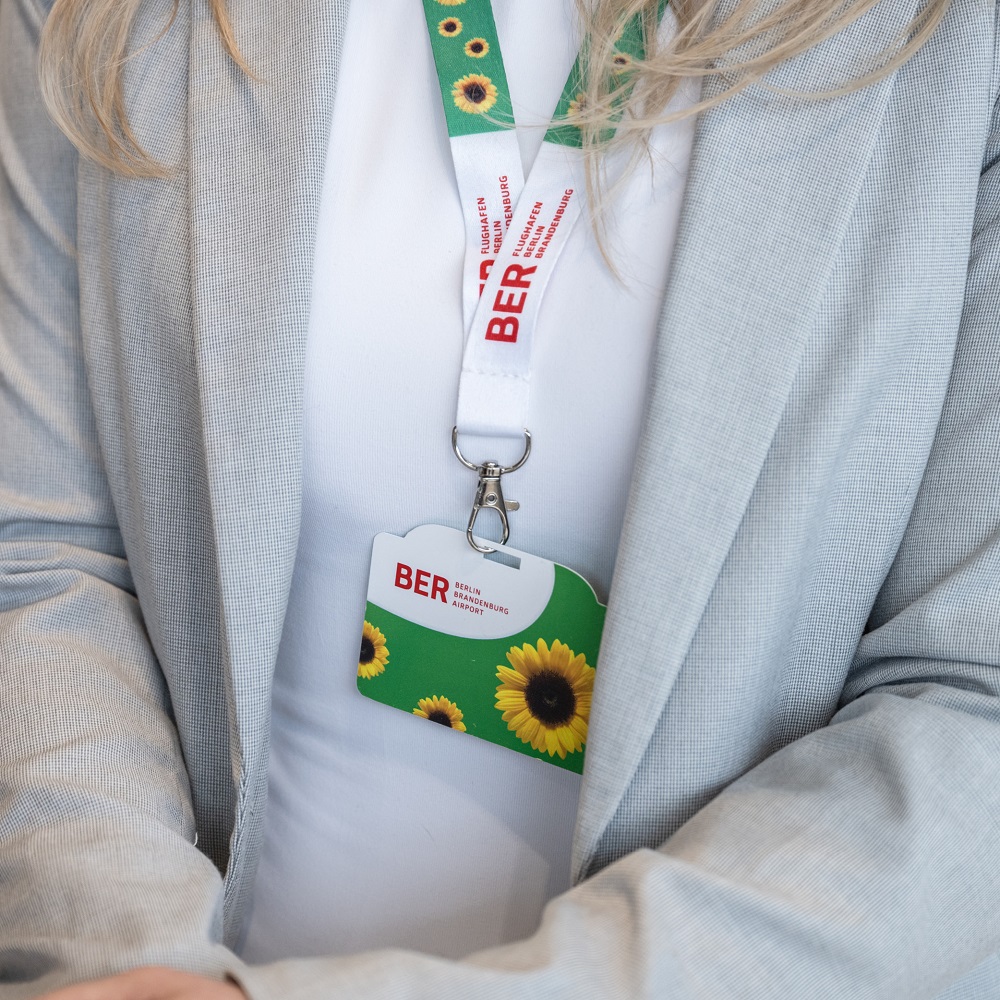Tool for hidden disabilities
For people with hidden disabilities, it is often a big challenge to get from one place to another or through spaces or places with lots of people, like our airport, for example. Berlin Brandenburg Airport is the first German airport to launch the Sunflower lanyard. The Sunflower lanyard is an internationally recognised symbol for hidden disabilities.
The Sunflower lanyard is a tool for people with hidden disabilities who want to indicate that they have a disability that cannot be seen with the naked eye. This way everyone at the airport – both staff and fellow passengers – are aware that these people may need assistance, a little more time or a little patience during their stay at BER.
The lanyard is available at BER with immediate effect and without further proof
- at all passenger information desks
- and from the Mobility Service.
Questions and answers
The Sunflower lanyard is a tool for people with hidden disabilities who want to discreetly indicate that they have a disability that cannot be seen with the naked eye.
Just because you cannot see something does not mean it is not there. What all hidden disabilities have in common is that they are not immediately recognisable. For people with hidden disabilities it can be a big challenge to get from one place to another or through spaces or places with lots of people, like our airport, for example.
The spectrum of hidden disabilities is broad: they can be physical, mental or neurological and include, but are not limited to, autism and ADHD, cognitive impairments such as learning difficulties and dementia, as well as mental health conditions and speech, visual impairments or hearing loss. They also include respiratory and chronic conditions such as asthma, diabetes, chronic pain and sleep disorders that significantly affect daily life. Many people also have a combination of visible and hidden disabilities and illnesses.
The Sunflower lanyard is available at BER at all passenger information desks and from the Mobility Service. Passengers and interested parties can simply ask for the Sunflower lanyard. Staff will provide it free of charge and without any questions or the need for further proof.
No proof is required to receive the Sunflower lanyard. It is available at BER at all passenger information desks and from the Mobility Service. Staff will provide it free of charge and without any questions or the need for further proof. It is strongly encouraged to also hand out the Sunflower lanyard to family members, friends or travel companions of people with non-visible disabilities. Offering help and raising public awareness of invisible disabilities are at the heart of the Sunflower.
The Sunflower lanyard was launched in 2016 as a symbol for hidden disabilities. The Sunflower symbol allows people with hidden disabilities to make the invisible visible. This is intended to make getting around in public places, such as airports, more pleasant, therefore making it easier to travel.
The company “Hidden Disabilities Sunflower” was founded in the UK to meet the rapidly growing demand to support people with non-visible disabilities. It is now widely recognised in many sectors, including travel. Today, the global Hidden Disabilities Sunflower works to raise awareness of hidden disabilities and improve disability inclusion.
Berlin Brandenburg Airport (BER) is the first commercial airport in Germany to offer the Sunflower programme in cooperation with Hidden Disabilities Sunflower.
By wearing the Sunflower lanyard, staff on site can see that the wearer has a hidden disability. However, they will not know what kind of disability it is and what the individual challenges are. Wearing the lanyard indicates discreetly that the wearer may be asked what support would best help them in a given situation.
Wearing the Sunflower lanyard does not give anyone any legal or financial benefits. However, staff from companies working at BER will be attentive and do everything they can to provide support within their respective capabilities.
Wearing the Sunflower lanyard is a voluntary choice. Wearers decide if and when they want to wear it. The Sunflower lanyard can be worn during the passenger’s entire stay at BER or in those situations and places where support is needed.
People who wear the Sunflower lanyard want to travel independently, despite their hidden disability, and do not usually want to be escorted through the terminal with the help the Mobility Service. The Sunflower lanyard allows wearers to discreetly signal to staff at BER as required: you cannot see my disability with the naked eye, but I might need a little more time or some support.
The Mobility Service is offered to people who have limited mobility and, therefore, require assistance from others to get through the airport. Therefore, each passenger is free to decide whether they want assistance from the Mobility Service or whether they can make their way to the aircraft alone.
Anyone can get a lanyard from one of the passenger information desks or from the Mobility Service. No evidence is required and no questions will be asked. Offering help and raising public awareness of invisible disabilities are explicitly encouraged and are at the heart of the Sunflower.
Yes. Any Sunflower lanyard can be worn at BER. The Sunflower symbol is an internationally recognised symbol for hidden disabilities and is recognised by all participating airports, airlines and companies.
Many airports and airlines around the world use the Sunflower lanyard and support Sunflower wearers. By wearing the Sunflower symbol, passengers at BER and other participating airports (stopover or destination) can clearly signal their desire for support.
